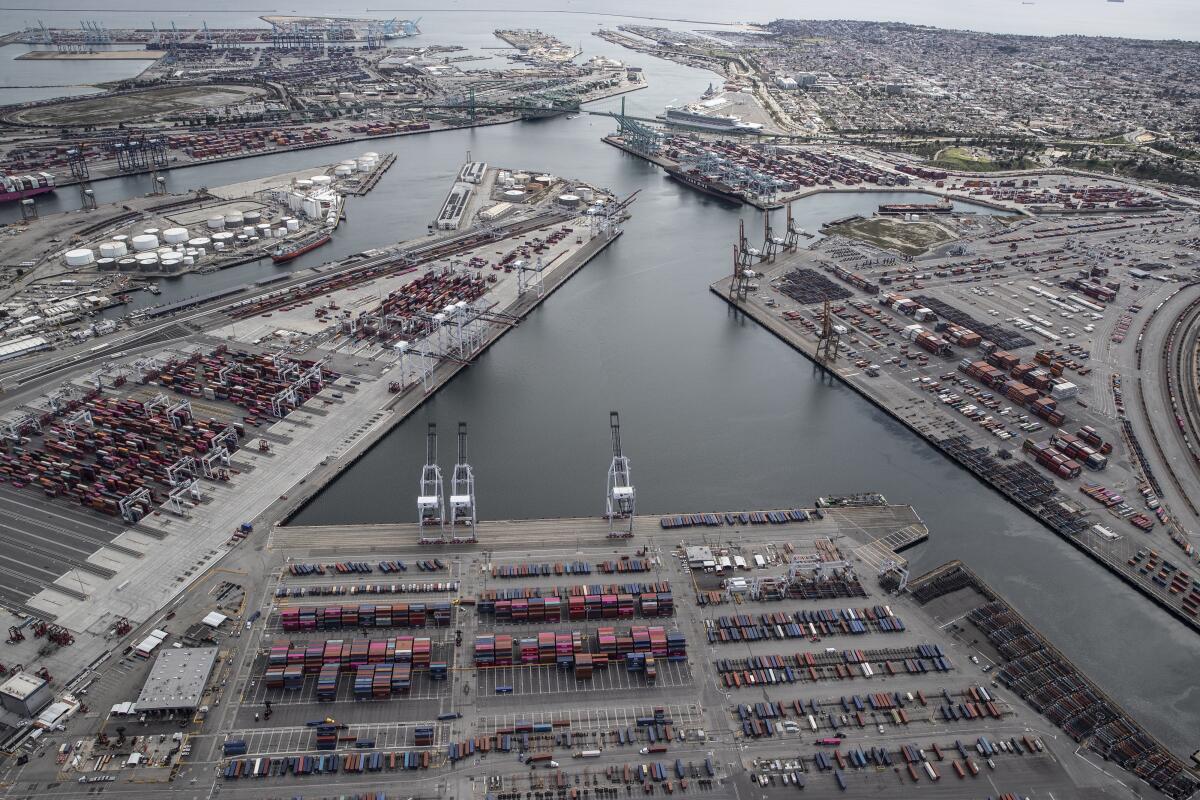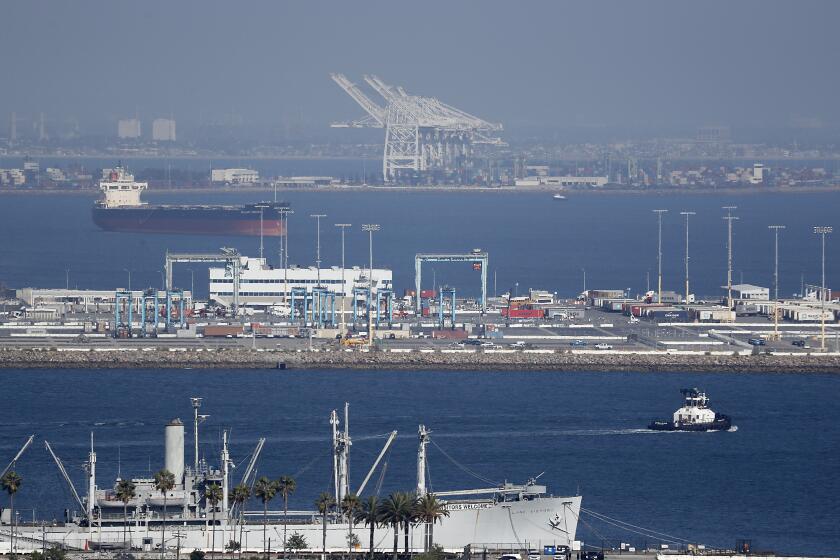Ports and dockworkers seek delay on ship pollution cuts, citing coronavirus

- Share via
California ports and dockworkers, already hit by a major slowdown from the coronavirus, are asking state regulators to delay moving forward with new rules intended to reduce air pollution from cargo ships.
They are seeking to delay until January 2021 rules under consideration by the California Air Resources Board that would increase the number of oceangoing ships that, while docked in port, must either shut down their auxiliary engines and plug into shore-based electricity or connect to emissions controls.
The Port of Los Angeles is trying to maintain an “orderly flow of goods — especially food and medical supplies” to make sure the nation can sustain its response to the pandemic, executive director Gene Seroka wrote in a March 23 letter to state environmental regulators. The rule-making process would be difficult, he wrote, “at a time when we are trying to focus the efforts of our supply chain partners on the singular goal of addressing the COVID-19 crisis.”
Hector De La Torre, a former state assemblyman who sits on the California Air Resources Board, said he would consider the merits of the request but noted that the ports and shipping industry had expressed opposition to the proposal long before the coronavirus emerged, and that the new requirements would not kick in for years — well after the threat from the virus is expected to ebb.
“We’re seeing a lot of this from a lot of special interests who are trying to take advantage of this horrible situation to seek out suspensions or postponements of regulations, not just at CARB but across government,” De La Torre said. “But we cannot trade one public health crisis for an ongoing public health menace, which in this case is air pollution.”
Dockworkers and a group of California’s publicly owned seaports made a similar request in a separate letter on March 24.
“This pause would afford ports and port workers time to get through the COVID-19 outbreak and navigate its economic impacts prior to enacting a regulatory change that could complicate economic recovery,” said the letter to state officials from the International Longshore and Warehouse Union and the California Assn. of Port Authorities.
The nation’s largest port is hurting. That may be a leading indicator of the pain that’s in store for Southern California and the U.S. economy as businesses hunker down to deal with the rapidly expanding new coronavirus.
A spokesman for the Port of Long Beach, which is part of that association, said it supports the request “for more time to work on the development of new, additional requirements.”
“Given the time and resource constraints that we are all under, it’s difficult to participate in the rule-making process at this time,” said Lee Peterson, spokesman for the Port of Long Beach.
Strengthening those regulations is considered a priority by the Air Resources Board because oceangoing vessels are on track to become Southern California’s largest source of smog-forming pollution by 2023.
Existing state regulations have forced increasing numbers of large ships docked at the state’s largest ports to plug in or to connect to machines that scrub their exhaust, but the regulations do not apply to more than half of the 8,000 ocean vessels visiting California each year. The proposal, which the Air Resources Board had planned to bring for a final vote this spring, would expand those restrictions to additional ports and vessel types over the next several years.
Before the coronavirus crisis, environmentalists and community groups from areas hit hard by the health impacts of port pollution worried that L.A. and Long Beach officials and the shipping industry would use their clout to weaken or delay the rules.
“Many communities have been in health and safety crisis before COVID-19 and have been routinely made to wait for any type of relief,” said Taylor Thomas with the group East Yard Communities for Environmental Justice. “Now more than ever, we need all life-saving measures — which includes reducing air pollution.”
Seroka said the process should be delayed because port workers are busy responding to the coronavirus and making sure their families and colleagues are safe and healthy.
“I don’t think it would be appropriate if the necessary stakeholders didn’t have a voice,” Seroka said at a press briefing Thursday.
Seroka vowed to continue implementing the Port of Los Angeles’ joint Clean Air Action Plan with the Port of Long Beach to reduce pollution from trucks, cargo-handling equipment and other sources. Once more people return to work and industry picks up, he said, “we will be more aggressive than ever in cleaning the air.”








